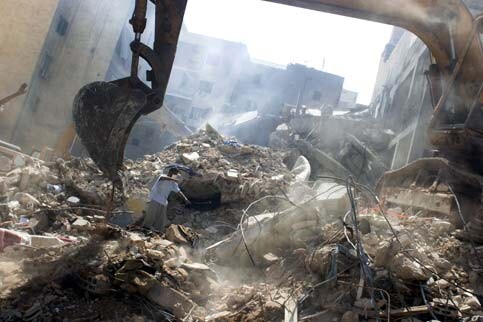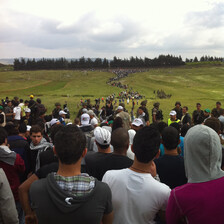Beirut 18 August 2006

Lebanese rescue workers search through the rubble for survivors after an Israeli air strike in the Shiyah district in south Beirut in which 31 persons were killed, August 8, 2006. (MaanImages/Raoul Kramer)
We almost went south again early this morning. At the meeting yesterday, ISM volunteer Alberto Cruz reported that on his factfinding tour he had come upon Israeli soldiers preventing entry to the village of Maroun al-Ras, not far from the route that my team took yesterday. The mayor, who lived just outside the village, had told him that he had had no contact with the villagers who had remained in the town, mostly old people, for several weeks, and was very worried for their welfare.
Alberto and a Venezuelan journalist determined to find out for themselves and were turned away. We therefore discussed the feasibility of doing an action to reach these people. Although we had sufficient volunteers, we decided to call it off late last night for several reasons. First, roughly half the volunteers had no training and no experience in such situations. Second, the meeting had already scheduled a training session to take place in Beirut tonight, which would have to be canceled because the trainer (Huwaida) and some of the trainees would be in the south. Finally, one of our number currently in the south reported by phone that she had been successful in reaching Maroun al-Ras with a team from Medecins Sans Frontieres.
We therefore decided that it would be more important to do the training this evening and then consider going tomorrow. We intended to go tomorrow for two days anyway as a large group, to do a retreat and extended strategy session over two days at a large house in the country, so some of us could leave earlier to try to do an action at Maroun al-Ras or another village still occupied by Israeli troups. Huwaida is leaving on Saturday, and although Adam and I can do some training, she is definitely the best in this regard, and can do it bilingually much better than either of us. It is therefore a high priority to use her to best advantage before she leaves.
The retreat will be a major milestone for ISM-Lebanon. We will discuss the goals, structure and decision-making procedures of the group. It remains to be seen to what extent we will have a role if the Israeli military pulls out completely. I see us as useful in making nonviolent trouble for foreign occupiers and usurpers, especially when they are on the soil of an indigenous population without their consent. I therefore wonder how much we will have to do if Israeli forces do in fact pull out from everywhere except the Shebaa farms. Is that the only place to try to mount resistance? The situation was always different from Palestine in several important respects, and it’s now becoming less and less so.
Paul Larudee is the former supervisor of a Ford Foundation project in Lebanon, a Fulbright-Hays lecturer to Lebanon and a contract U.S. government advisor to Saudi Arabia. He is one of seven volunteers of the International Solidarity Movement wounded by Israeli gunfire on April 1,2002. He can be reached at larudee@pacbell.net.
Related Links



